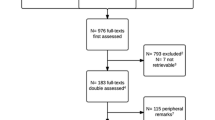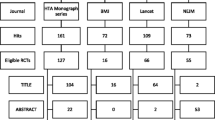Abstract
Purpose
This paper describes the experience of the Ethics Committee of the Medical University of Vienna, Austria, while managing the workload of clinical study applications.
Methods
An expedited review process was introduced for initial review of study protocols regarded as minimal risk interventions in March 2004.
Results
A total of 504 study protocols were submitted for review in 2003 and this number has increased to 743 in 2007. Two hundred sixty eight studies were classified as minimal risk in 2007 and allocated to a subgroup of the Committee for review. The time to full approval was shorter for these studies as compared to other protocols.
Conclusions
Implementation of initial expedited review can improve the performance of an Ethics Committee. A framework to achieve a single opinion for multisite research of minimal risk interventions should be considered to facilitate these low risk studies.

Similar content being viewed by others
References
Vick CC, Finan KR, Kiefe C, Neumayer L, Hawn MT (2005) Variation in institutional review processes for a multisite observational study. Am J Surg 190:805–809
Green LA, Lowery JC, Kowalski CP, Wyszewianski L (2006) Impact of institutional review board practice variation on observational health services research. Health Serv Res 41:214–230
Dyrbye LN, Thomas MR, Mechaber AJ et al (2007) Medical education research and IRB review: an analysis and comparison of the IRB review process at six institutions. Acad Med 82:654–660
Larson E, Bratts T, Zwanziger J, Stone P (2004) A survey of IRB process in 68 US hospitals. J Nurs Scholarsh 36:260–264
World Health Organization (2000) Operational guidelines for Ethics Committees that review biomedical research. Available at http://www.who.int/tdr/publications/publications/pdf/ethics.pdf. Accessed 01 Sept 2008
European Commission (2006) Definition of investigational medicinal products (IMPs), definition of non investigational medicinal products (NIMPs). Available at http://ec.europa.eu/enterprise/pharmaceuticals/pharmacos/docs/doc2006/07_2006/def_imp_2006_07_27.pdf. Accessed 01 Sept 2008
Directive 2001/20/EC of the European Parliament and of the Council of 4 April 2001 on the approximation of the laws, regulations and administrative provisions of the Member States relating to the implementation of good clinical practice in the conduct of clinical trials on medicinal products for human use (2001) J Eur Commun L 121:34–44
Acknowledgments
We gratefully acknowledge the administrative assistance of Ursula Angerer, Medical University of Vienna.
Author information
Authors and Affiliations
Corresponding author
Rights and permissions
About this article
Cite this article
Wolzt, M., Druml, C., Leitner, D. et al. Protocols in expedited review: tackling the workload of ethics committees. Intensive Care Med 35, 613–615 (2009). https://doi.org/10.1007/s00134-008-1343-x
Received:
Accepted:
Published:
Issue Date:
DOI: https://doi.org/10.1007/s00134-008-1343-x




